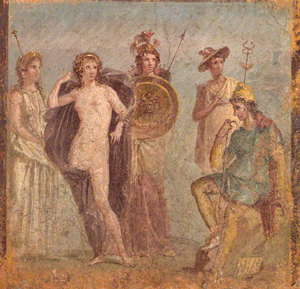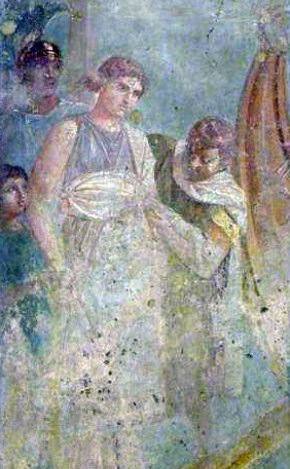
Judgment of Paris -Paris is on the right (A fresco from Pompeii, ca. 79 AD)
Who is the most beautiful?
Once upon a time, around 1250 BC, toward the end of the Bronze Age in Greece, three goddesses were having an argument (said the Greeks). The goddesses Aphrodite, Athena, and Hera were arguing about which one of them was the most beautiful.
Greek goddesses
More Greek mythology
All our Ancient Greece articles
Paris is the judge
They agreed to choose a human man and let him decide. More or less at random, the goddesses picked Paris, the youngest son of King Priam of Troy, to be their judge. Paris was really not so brilliant. He was working as a shepherd, alone in the fields with his sheep.
History of sheep
The goddesses offer bribes

Kidnapping Helen of Troy (from Pompeii)
Each of the goddesses offered Paris a bribe to get him to vote for her. Athena offered him wisdom. Hera offered him power. But Aphrodite offered him the most beautiful woman in the world, and Paris voted for her: that’s the judgment of Paris.
Aphrodite pays Paris
So Aphrodite had to come through on her promise. She sent Paris to go visit the Greek king of Sparta, Menelaus (men-uh-LAY-us). Menelaus was married to Helen, who was the most beautiful woman in the world.
Who was Helen?
Menelaus and Helen
The city of Sparta
Guest-friendship in Greece
Menelaus and Helen welcomed Paris kindly, and gave him dinner and let him stay the night in their house. But during the night Paris convinced Helen to run away with him (because Aphrodite made her agree). He took her back to Troy with him and married her, even though she was already married to Menelaus.
What does this story mean?
People sometimes see Helen as a cheater, but that depends on how you understand the idea that the gods made her do it. Are the gods forcing her, so she didn’t consent and was really kidnapped and raped? Or is this a metaphor for being overcome by your own feelings, like losing your temper, or losing your heart? In that case we might blame Helen more.
But remember, Helen didn’t choose freely to marry Menelaus, either. We don’t know how she feels about him. Shouldn’t she be free to leave if she wants to? She’s not trying to hide it from Menelaus.
Another possible meaning
It’s also possible that this story is covering up an even less attractive situation where the Greeks needed a lot of women to work spinning and weaving in textile factories. Maybe they got those women by kidnapping them from other places and enslaving them (and also raping them).
History of spinning
And weaving
Slavery in ancient Greece
The Greek economy
If so, then making the women seem to have left more or less because they chose to is a way of covering up the exploitation of textile workers – a very modern theme.
Learn by doing: how would you feel if you were Helen?
More about Helen of Troy
Bibliography and further reading about Paris and the Trojan War:
The Iliad of Homer (Oxford Myths and Legends), by Barbara Leonie Picard. A retelling of the story.
The Iliad, by Gareth Hinds. In graphic novel format; great reviews from 6th graders.
The Trojan War, by Olivia E. Coolidge (2001). Clear and interesting retelling. Includes the episodes that aren’t in the Iliad (like Paris, and the Trojan Horse).
Troy, by Adele Geras (2001). A young adult novelization of the story, from the point of view of the Trojans.
Approaches to Teaching Homer’s Iliad and Odyssey, by Kostas Myrsiades (1987).
The Iliad (Penguin Classics) by Homer. Translated by Robert Fagles. A great translation!




